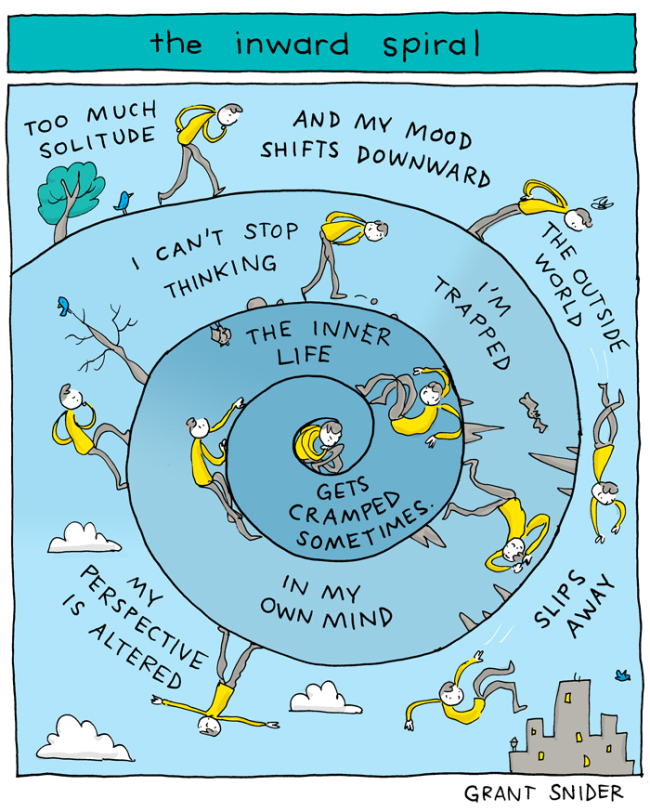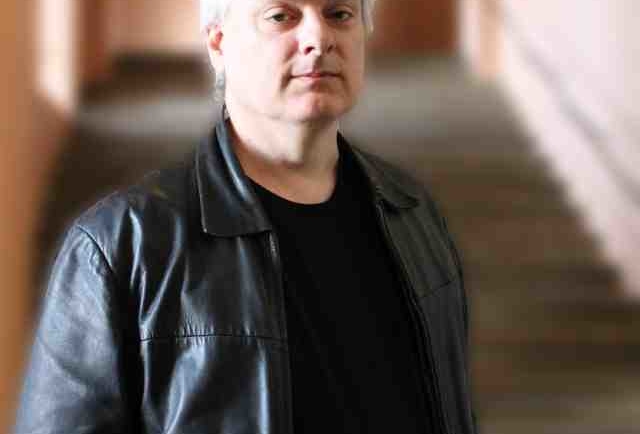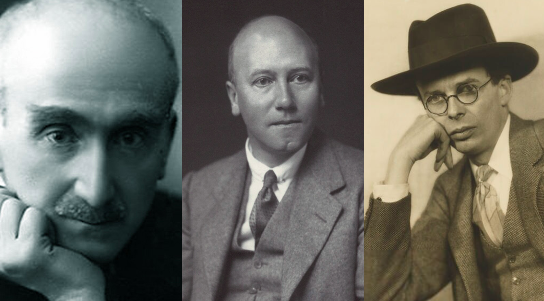Why does philosophy often not help to understand the human mind and, on the contrary, obscure things? Why are questions of philosophy “eternal”? The “mother of Sciences” has influenced how we read the human mind and see it as an eternal riddle. Nevertheless, in philosophy, ambiguity is not inevitable, but it has its historical roots where it occurs. Let me try to open them a bit.
How the vowels change the game
Philosophy was not born by chance in Greece. Just before it popped up, about 700 BC., the Greeks did something extraordinary — they added vowels to their alphabets! This fact, which has received little attention, may explain the essence of philosophy surprisingly well. Adding a few characters to the alphabet converted Greek to a phonetic writing system and began a silent revolution in Greek thinking. As early as the 5th century BC, literacy was widespread in Greece, and in the following century, there was a sizeable literate audience in the country. However, it had the effect that thinking became more static and dominated by the verb to be.
Greek philosophy was influenced not so much by the older wisdom and mythological cosmogonies but instead writing and new alphabets.
Even before the birth of philosophy, the renewed alphabet had given birth to the Greek-speaking world many “wise” thinkers (including Thales), rhetoricians, and so-called sophists, each taking advantage of the possibilities of new writing in their activities. The “wise” thinkers created a series of striking guidelines for life, such as “know thyself”. Sophists and rhetoricians, in turn, used writing as a tool in politics. The vowels made the text easier to read and interpret and provided better memory support. Many speakers first wrote their speeches and then memorized them before their discourse. Thus, the truth was replaced by eloquence as it measured the political success of free citizens in Greek city-states.
Writing also contributed to the emergence of democracy; according to the Greeks, writing should not be a mystery but a right of all free citizens. These ideas also led to a detachment from old mythological explanations and rationally explaining reality. These reflections gave rise to philosophy, which did not focus on eloquence but on loving wisdom. Philosophers borrowed their method from ancient mythologies, both wise and ambiguous. This method was dialectics. At the same time, philosophers broke the oral nature of myths and made the personality of tales public through speeches and writings.

Alpha and omega. The beginning and the end of the Greek alphabet. In philosophy, everything had to go between these letters. So things that could not fit there were no longer relevant in philosophy. And they were plenty.
The development of the writing highlighted new kinds of problems that Greeks had not addressed before. These problems marked the beginning of the sciences in the modern sense. Admittedly, all the issues posed by philosophers were theoretical. That is, dealing with them requires only reason and reasoning. However, although the reality was tangible and not speculative, the philosophers said they represented the study of reality. To that end, they defined traditional knowledge and truth differently. Science has evolved a lot from this, but philosophy still deals with the same questions.
Are the questions as tricky as philosophy suggests? What does the long list of unsolved problems in philosophy mean?
Dialectics without mythology
Philosophy emerged as a method of inquiry and questioning. The philosopher Plato introduced it most systematically. However, the emphasis on “ignorance” that is essentially universal in philosophy was not Plato’s invention. Greek mythology first described wisdom through questioning, guessing, and dialogue. But it was because only periphrases and parables could express what the rational explanations could not. The discussions showed the inadequacy of language and the necessity of interpretation when unconsciously created wisdom was concerned. In mythologies, there was no communication between man and the gods—or the unconscious—because man could not speak to the gods (or the unconscious), only interpret the “irrationality” of the gods to the best of his ability. Divine “messages,” or challenges, called problemas, were riddles because they came from outside everyday rationality, which rational language obviously could not reach. The only way to understand the problemas was to interpret them. Thus, wisdom and language did not mean the same to the early Greeks.
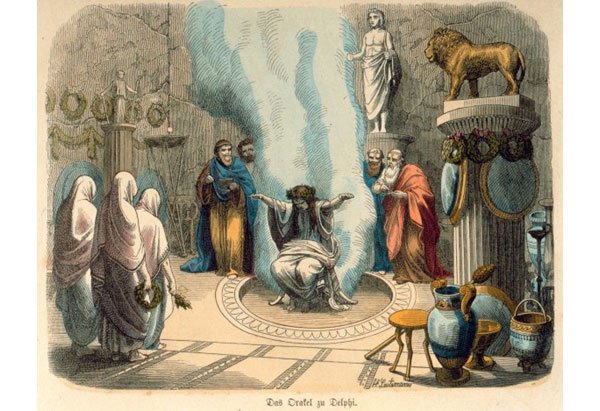
Pythia, The Oracle of Delphi, answered the questions with parables.
But philosophers disagreed.
They were not interested in interpreting any unconscious wisdom. Their desire for information was purely theoretical. They drew their attention only to the rational expressions of this wisdom, to language. Philosophers believed that scripture provides the key to what previous generations did not have: the mastery of wisdom through scripture and dialectics. Therefore, they could solve the riddles just by studying them theoretically. As a result, the stream of information shortly narrowed into a tiny trickle and focused only on human language. It soon became apparent that the world did not open as expected, but in many places, it did the opposite; that is, it raised new questions and problems. It seemed a bit as if philosophers had begun going around in circles.
Labyrinth
Now, I would like you to consider the possibility that the ancient Greek myth of Narcissus would precisely tell about this. Wasn’t it just a philosopher who fell to love with his reflection in a pool of water! In the story, the renowned sage Teiresias predicts that nymph Leiriope’s son Narcissus will die if he gets to know himself. While shepherding, Narcissus drifts to a mountain spring, where he finally sees something that fulfils his ideal of pure love:
” I am charmed, and I see; but what I see and what charms me I cannot find” – so serious is the lover’s delusion – and, to make me grieve the more, no mighty ocean separates us, no long road, no mountain ranges, no city walls with close-shut gates; by a thin barrier of water we are kept apart.”
The Greeks warned of the dangers of literary or theoretical reflection and the belief in rationality and language’s unlimited abilities. They thought philosophy fell precisely into that trap. Philosophy got lost in a maze of theoretical reflection it could no longer escape. The love of philosophy for wisdom would only be the love for one’s image, that is, language reflected in writing. Philosophy would be incapable of seeing that it is the cause of its problems. Philosophy could also not reach the object of its love–philosophy itself–detected in the reflections, but it could not be separated from it either. It was a dead end.
“Oh, I am he! I have felt it. I know now my own image. I burn with love of my own self; I both kindle the flames and suffer them. What shall I do? Shall I be wooed or woo? Why woo at all? What I desire I have; the very abundance of my riches beggars me. Oh, that I might be parted from my own body! And, strange prayer for a lover, I would that what I love were absent from me! And now grief is sapping my strength; but a brief space of life remains to me and I am cut off in my life’s prime. Death is nothing to me, for in death I shall leave my troubles; I would he that is loved might live longer; but as it is, we two shall die together in one breath.”
How could a philosopher, doomed to eternal asking and paradoxes, characterize himself better than by repeating the lament of desperate Narcissus staring at the pool’s reflection? “Still may it be mine to gaze on what I may not touch, and by that gaze feed my unhappy passion.” Is this not a fair description of the never-ending disaster of the Western world in the chase of truth?!
There is something even stranger in this love: if philosophers find the answer or the truth, they will make themselves useless! They destroy the lovable from the world! The philosophers’ task is to make themselves unnecessary: the more answers, the less they have to say. But, as bold as philosophy strives to be, it does not dare to say this out loud. Philosophy declares that it seeks the truth, even though it knows that the truth will destroy it. Therefore, philosophers avoid correct answers and truth so much that they answer only with questions. This disease has spread to other sciences as well.
“Know thyself”?
It is important to note that Teiresias predicted Narcissus to die if he got to know himself. And so he did: “Oh, I am he! I have felt it. I know now my own image. I Burn with love of my own self.” “Know thyself”, gnōthi seauton in Greek, is a sarcastic reference to the writing in the front yard of the Temple of Apollo, from which Socrates and his followers made the guiding idea of all philosophy. Teiresias thus warns of the danger of philosophy! Before the love for writing, the Greeks did not tend to engage in ta eis he’auto [things to one’s self] or knowing themselves by writing like the newer generations. Written wisdom was against Greek thinking that wisdom had to be interpreted. Wisdom was always contextual. There were no truths carved in stone.
The myth of Narcissus also lets us know why the goddess Nemesis punished Narcissus: Narcissus had abandoned the nymph Ekho, who was in love with him. Ekho refers here to the early oral culture of Greeks, which this writing-loving individual had rejected! Therefore, Nemesis punished Narcissus by denying him to fall in love or…. Narcissus sealed his destiny when he found love by looking at a pool in the mountains.
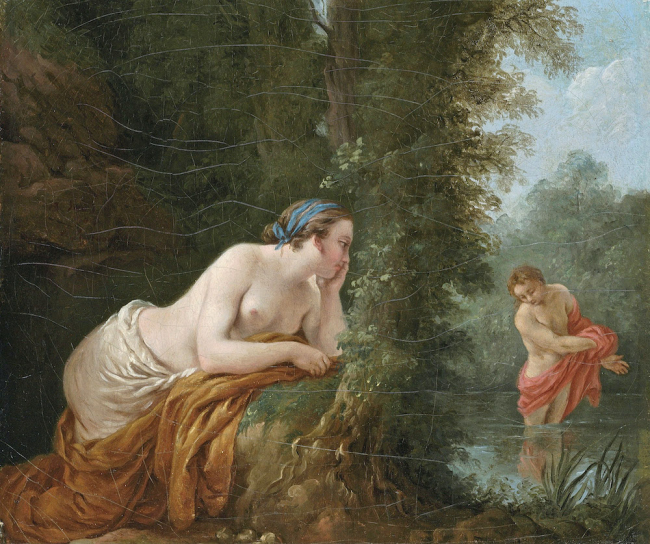
Echo (Ekho) and Narcissus. The fall on Greek wisdom. A painting by Louis-Jean-François Lagrenée.
The wisdom that can be seen only
Philosophers mechanically turned problems into scepticism, a systematic doubt of the possibility of knowledge, a permanent ignorance. Plato copied the dialogue from mythologies, making it a genre that directly modelled today’s academic dissertation. Yet, paradoxically, this declaration of ignorance still means the highest existing knowledge.
Plato replaced the “twilight of the soul” with illuminating reason. He rejected the world of the Gods and created a world of ideas instead. Plato mystified reason by making the divine rational—and the rational divine! He changed the priorities of things and their metaphors: instead of hearing the truth, he brought the seeing of the truth. The means of achieving wisdom changed from ear to eye. Knowledge became visual for Plato, which is why he used the word idea, idein (ιδειν), to see. Indeed, it has been widely stated that since Plato, Western thinking became increasingly based on visual metaphors—knowledge became enlightenment, knowing became seeing, and truth became light. Before Plato, knowledge had been more intuitive. For Heraclitus, for example, knowledge was ksuniemi, which meant knowing based on consultation and thus included interpretation and possibly even dialogue.

Philosophy is an endless project with no solution.
The “replacement” of the senses was neither accidental nor insignificant. Plato’s literary production was a determined action from Greek multisensory culture to the visual one. The change coincided with Plato’s literary ambition, for the visuality of ideas (Plato’s cave allegory also emphasized seeing) supported writing as a herald of wisdom and truth. The visibly written text reinforced the rational, conceptual, and visual nature of thought, whereas perception and comprehension were no longer on the agenda of philosophers. The light signified the truth; the most significant icon was the sun shining in the sky, the prerequisite for all life.
At the same time, Apollon rose from the obscurity of poetry to a more understandable God of light and sun and began to proclaim a new message of self-knowledge. For this new Greek worldview, hearing meant only passive satisfaction with reality, while seeing meant the domination of reality and a thirst for knowledge. In the enlightened world, there were no more secrets of the gods; the truth was reached by illuminating things, that is, by writing about them—even immortality and liberation from the body required, according to Plato, rational thinking and intellectual life.
The transition from oral to written culture meant the texts were no longer context-sensitive. Plato’s works represented a massive cultural revolution and, in fact, the first determining step from mythology to philosophy, from oral culture to visual and non-literary to literary. The significant change in the perception of knowledge led to a definite distinction between subject and object, invalidating knowledge interpretation. The gradual disappearance of interpretation also meant the possibility of bypassing unconscious processes. This weathering of wisdom meant a boost, especially for learned civilization. What could not be written became uninteresting.
The deification of reason marked the beginning of the present Western sciences and, in fact, the birth of the Western rational culture. The time of the poets was over. It was time to distinguish between divine revelations and human wisdom. Plato’s writings marked a departure from traditional knowledge and a shift toward politics. Philosophy was the cultural product of this change. Philosophers always regretted that language had been left in the hands of ordinary people, and thus philosophers could not decide what words to use and what meanings to give to concepts. They say that philosophical problems would be much simpler without ordinary folks.
So what is wrong with philosophy?
The primary information-theoretical anxiety of our existence stems from a philosophy. It embodies the contradiction between mental teenage and adulthood as new theories throughout the centuries. Those theories deal with abstract reality and conceptual imagination, but not reality. But unfortunately, philosophers refuse to “get their hands dirty”. They refuse to reflect on what is beyond written language’s reach.
The principal reason for the philosophical problems is rationality. It is a tool that does more harm than good. It is closed and utterly incapable of communication. It is just a self-feeding system that eventually leads to syllogistic captivity. Reasoning produces only information within the given premises; it has no creativity. The mission of reason is only to destroy uncontrolled, frightening, and “empty” space from the world. In the psychological sense, it has a role in safeguarding childhood development. The reason is that nature covers our eyes and prevents us from seeing reality “as such”. So, our body firmly controls the human world of wits and senses. Throughout adulthood, we stubbornly try to squeeze the world into our tiny rational worldview rather than do it the other way around.
